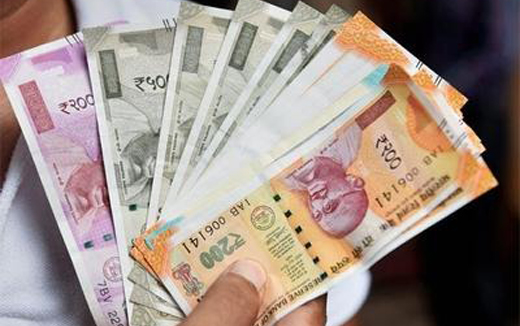Demonetisation in India: Cash is back as king; at record high level
Demonetisation in India: Cash is back as king; at record high level
Mangalore Today News Network
Bengaluru, Apr 10, 2018 : A year-and-a-half after the note ban, cash circulation has returned to its peak levels despite several measures initiated by the government to increase digital transactions.

In fact, the cash availability has exceeded the pre-demonetisation levels to touch a record high of Rs 17.97 lakh crore, up 1.9% from November 2016. Prior to the note ban, the currency in circulation was pegged at Rs 17.64 lakh crore, data available with the Reserve Bank of India (RBI) shows.
On November 8, 2016, Prime Minister Narendra Modi, in his emergency address to the nation, declared that Rs 500 and Rs 1,000 notes would be invalid within four hours, sending the economy and the country into wild goose chase.
At the time of demonetisation, high value notes constituted a whopping 85% of the total currency under circulation.
Post-demonetisation, the country reeled under terrible cash crunch, with cash circulation going down by 51% within two months, reaching as low as Rs 8,73,402 crore as on January 6, 2017.
However, by mid-March this year, the cash in circulation has overtaken the pre-note ban levels, RBI data revealed.
Currency available with public has also reached a record high of Rs 17,52,851 crore, up 124% from the low of Rs 7,83,257 crore as on December 9, 2016. In just a matter of one month post-demonetisation, currency in the hands of public had come down by 54% from Rs 17,02,210 crore.
However, rupee coins, which are issued by the government, have seen a stagnation in the past couple of months, capped at Rs 24,855 crore.
"The use of non-cash transactions in a predominantly unorganised economy is never viable. The impetus on digital transaction was just an after thought, when all the notes were returned to the RBI," Govinda Rao, member, fourteenth finance commission, said.
Yet, woes continue
Many traders and businesses told DH that they have not seen any impact of increased circulation owing to "the trust issues with the government".
"This is the government of cronies. We don’t know what is going to happen in three months time. We have trust issues also with the government, due to which the length of our trade cycles have increased," Ramesh Lahoti, Chairman-Internal Trade, Federation of Karnataka Chambers of Commerce and Industry, (FKCCI) said.
courtesy:DHNS
- US arrests over 500 illegal immigrants, deports hundreds using military aircraft
- SC issues notice to actor Darshan, others in Renukaswamy murder case
- 8 dead in explosion at Maharashtra ordnance factory, blast heard 5 km away
- House help sexually assaulted, killed with boulder in Bengaluru
- Novak Djokovic out of Australian open 2025, retires mid-match due to injury
- Two Indian-origin among 5 charged for robbery in US
- India to get 1st human underwater submersible for ocean exploration this year
- Man sets himself on fire as wife refuses to withdraw divorce petition
- Woman sends Mangalsutra to Home Minister, seeks justice for husband
- Pack of dogs attack, drag elderly woman in Punjab’s Khanna
- Viral garland seller faces harassment by men, sent back home by father
- Infosys expands its campus in Hyderabad, to create 17,000 new jobs
- Senior journalist Guruvappa Balepuni passes away
- Akshaya Patra launches Green Initiatives and ISKCON Mangalore project
- Sullia: Boy missing from Shantimajalu traced
- Total breakdown of law and order machinery in state, alleges MP Brijesh Chowta
- Exorbitant airfares on Dubai-Mangalore route: A call for review
- Udupi: Yakshagana artiste assaulted over financial dispute
- Mangaluru: 14 arrested in connection with salon attack at Bejai
- Governor cajoles youngsters to engage more in sports to learn teamwork and cooperation
- Bantwal: One held from Kerala for cheating Vitla resident ₹30 lakh by posing as ED officials
- Mangaluru: Annual Flowers and Fruits Show inaugurated at Kadri Park
- Mangaluru: Alleging immoral activities, Rama Sena activists vandalize salon at Bejai
- Kundapur: Speeding autorickshaw fatally knocks down elderly man
- Dakshina Kannada secures twin golds in Kabaddi at Karnataka State Games 2025
- Sandhya Shenoy honored with Society for Materials Chemistry Medal-2024
- White Cornus Apartment in Mangaluru
- City girl wins first place in state-level spell bee competition
- Alleged ‘Love Jihad’ Case in Mangaluru: Woman left home voluntarily, says police
- Girl fatally struck by reckless two-wheeler near Belman
- New residential complex for the judges inaugurated in Mangaluru
- Absconding accused nabbed after 8 years
- Truck with cylinders turns turtle in Beltangady
- Bhoota Kola artist dies of cardiac arrest
- Development of the country should be our goal: Ganesh Karnik
- Container truck gets stuck under Modankap railway bridge
- Truck crushes bike’s pillion rider near BC Road
- Head constable dies of heart attack
- Udupi: PDO dismissed over financial irregularities
- CREDAI to resume Skill Development Program for Construction Workers in Mangaluru
- CITY INFORMATION
- TRAVEL
- TOURIST INFORMATION
- HEALTH CARE
- MISCELLANEOUS




 Write Comment
Write Comment E-Mail
E-Mail Facebook
Facebook Twitter
Twitter  Print
Print 



